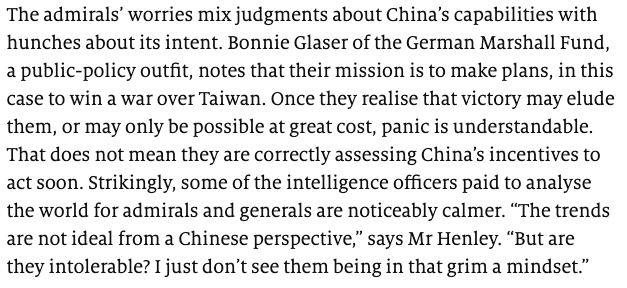
🧵 I recently spoke to a senior US defence official who set out some interesting figures on Chinese military modernisation. Nothing drastically new here, but sobering to hear it laid out in these terms:
"In the last five years, PLA has fielded about 90 modern major naval ships–cruisers, destroyers, frigates, submarines, amphibious lift, principal auxiliaries, refuelling, supply ships, intelligence ships–so they're averaging nearly 20 new ships a year over the last half decade"
"They [the PLA] have fielded more than 500 new fourth and fifth generation fighters. So more than 100 a year, on average, and a sustained rate at that. That's giving them much more capacity to conduct the major components of a unification campaign against Taiwan'
On the scale of the PLA's build-up: "a peacetime build up, modernization and expansion of a force [on this scale] is unprecedented, at least in modern times. And the only real parallels to this rate of construction of high-end capabilities would likely be the Second World War."
"our [US] posture right now is pretty thin. It's a legacy of the Cold War, it's North Korea centric..by contrast, we have about the same number of major surface ships & submarines in the western Pacific as China built last year, about 20 or 22...it's a massive numerical mismatch"
On PLA lack of combat experience: "we also don't have that experience. We haven't executed major joint complex operations against a peer adversary in 75 years. And so we sometimes overstate the importance of our own capabilities in ways that are a little bit self congratulatory"
"There are mathematical calculations that smart people run through–the force allocations comparisons, geography, distance, weapons capabilities–and I think in every circumstance we can say it would be possible for the PLA to be successful in any of those campaigns [incl. Taiwan]"
More broadly, see @DSORennie's excellent briefing on Taiwan and his thoughtful attempt to parse some of the differing views on risk. "Strikingly, some of the intelligence officers paid to analyse the world for admirals and generals are noticeably calmer." economist.com/briefing/2021/… 

• • •
Missing some Tweet in this thread? You can try to
force a refresh









